Olivia Chow elected mayor of Toronto
Olivia Chow has been elected mayor of Toronto, ending almost 13 years of right-leaning rule at Toronto City Hall and becoming the first woman and the first visible minority person to lead post-amalgamation Toronto.
Chow, 66, was the favourite to win the race from the moment she entered and managed to command a decisive lead in the polls, though the race on election night ended up being a photo finish between her and Ana Bailão.
CP24 made the call at 9 p.m., with Chow appearing to have secured 37.2 per cent of the vote with more than 96 per cent of polls reporting. Bailão came in a close second, with 32.5 per cent of the vote.
- Here's our interactive map showing live election results from across Toronto
- What Olivia Chow promised to do as Toronto's mayor
A packed crowd of supporters erupted into cheers as the result was announced at Chow’s campaign headquarters.
Chow came out to speak with supporters shortly after 9:30 p.m.
“Wow. Thank you, Toronto! Thank you everyone. What a night!” she said, flanked by family. “If you ever doubted what’s possible together, if you ever questioned your faith in a better future, in what we can do with each other, for each other, tonight is your answer.”
She thanked the people of the city for their “mandate for change” as the city’s new mayor and pledged to dedicate herself to “work tirelessly to build a city that is more caring, more affordable and safe, where everyone belongs” and also thanked her supporters and volunteers for their tireless efforts.
“I know things are tough these days. It’s harder to get by and harder to get around, but don’t give up. Toronto is a place of hope, a city of second chances,” Chow said.
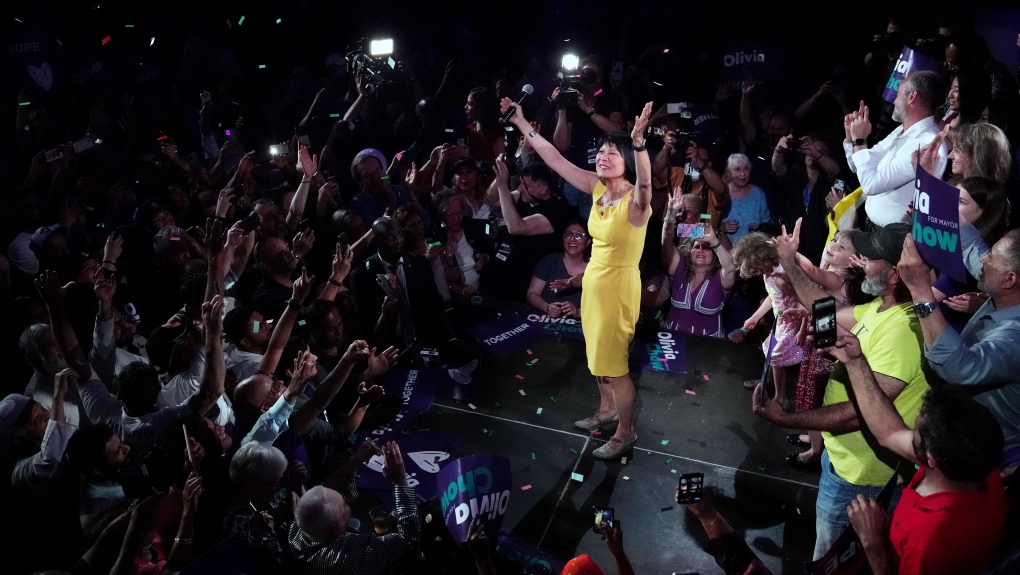
She called Toronto “a city where a kid from St. James Town can be standing in front of you as your new mayor” to loud applause and added that the city is a place “where if we chip in a little more we can improve public services and make our city more livable.”
She was cheered on by ecstatic supporters.
“We’re gonna have a very different Toronto where equity and sustainability will be part of everything the city does,” former candidate Gil Penalosa told CP24 as the results rolled in.
He said he was glad he dropped out of the race to support her, saying if he had gotten the 100,000 or so votes he got last time he ran, she might not have won.
LONG ROAD TO VICTORY
Running on a campaign to “build a caring city where everyone belongs,” Chow seemed often to float above the fray in a crowded field of candidates who desperately tried to present her as someone who would unnecessarily hike property taxes.
The second time turned out to be the charm for Chow, who ran for mayor and lost to John Tory in 2014.
It was Tory’s surprise resignation in February after admitting to an affair with a staffer that gave Chow a second shot at a win.
He released a statement Monday congratulating Chow and saying he would help her succeed as mayor in any way he can.
Running in a race which attracted 101 other candidates, Chow’s name recognition gave her an edge.
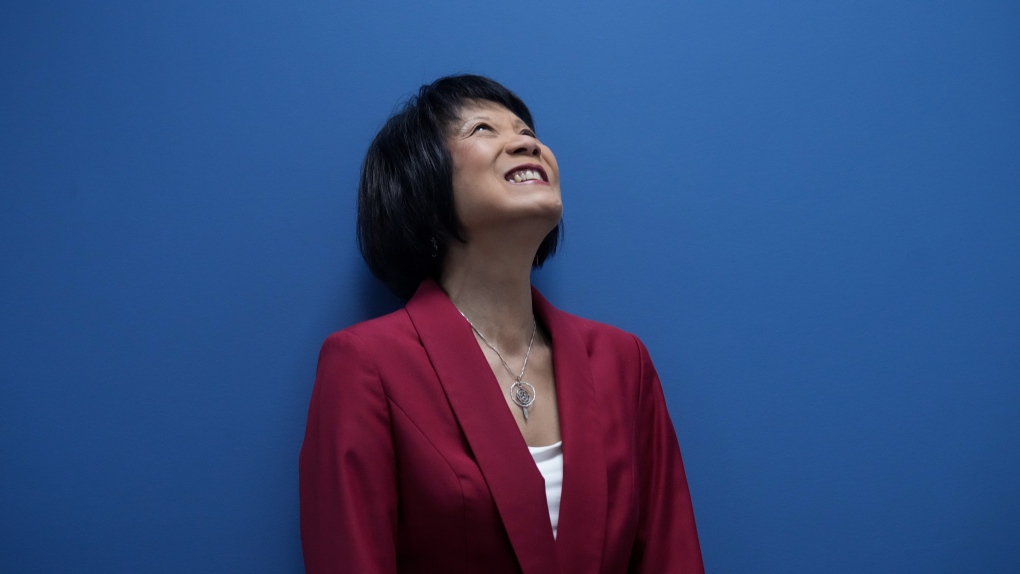 Toronto mayoral candidate Olivia Chow is photographed after a mayoral debate in Toronto, on Wednesday , May 24, 2023. THE CANADIAN PRESS/Chris Young
Toronto mayoral candidate Olivia Chow is photographed after a mayoral debate in Toronto, on Wednesday , May 24, 2023. THE CANADIAN PRESS/Chris Young
She cut her teeth as a school board trustee in the 1980s before going on to win a council seat in Toronto in 1992. She continued on council through amalgamation until 2005 when she ran for and won a seat as a federal MP.
An immigrant who came to Toronto from Hong Kong with her parents at the age of 13, Chow talked about their struggles to adapt to a new country under difficult circumstances. She started sewing buttons onto jeans as a teen to help her family, with her mother cleaning homes and her father unable to hold a steady job due to mental illness.
Chow is also the widow of the late NDP leader Jack Layton, who himself came to federal politics from Toronto City Council and led their party to unprecedented opposition status in 2011 in the so-called “orange crush” before his sudden death from cancer the same year.
Chow’s stepson Mike Layton served as a city councillor before stepping away from the role last year and was involved in her get-out-the vote efforts on Monday.
Late in the race, polls showed former city councillor Ana Bailão gaining ground, buoyed by a last-minute endorsement by Tory. But despite the endorsement — and the backing of almost half of council — she wasn’t able to catch up.
Chow also managed to win despite a fierce offensive by former police chief Mark Saunders, who ran on a law-and-order platform and styled his campaign as a mission to stop Chow from getting elected at all costs. Saunders had Premier Doug Ford backing him, with Ford publicly stating that a Chow win would be a “disaster.”
Saunders finished third, with 8.6 per cent of the vote.
Ford released a statement Monday night congratulating Chow on her win, saying that “while we’re not always going to agree on everything, what we can agree on is our shared commitment to making Toronto a place where businesses, families, and workers can thrive.”
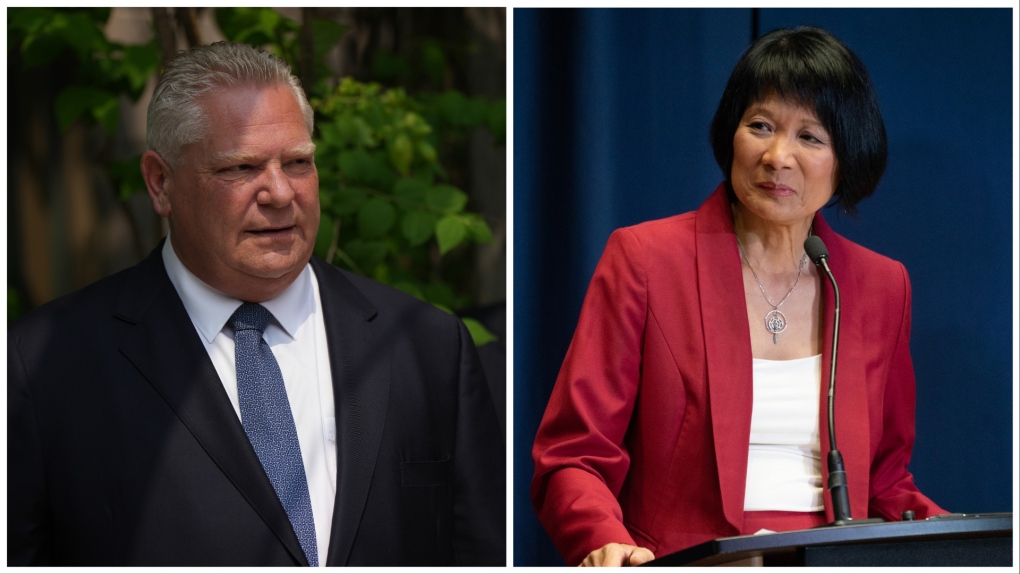 Ontario Premier Doug Ford and Toronto Mayoral Olivia Chow. (Canadian Press/Chris Young)
Ontario Premier Doug Ford and Toronto Mayoral Olivia Chow. (Canadian Press/Chris Young)
He said he hopes “that we continue to have a willing partner in the city of Toronto” as his government moves forward with its plans to “build Ontario.”
Chow told supporters she spoke with Ford and Municipal Affairs and Housing Minister Steve Clark, who “graciously” called her to offer congratulations.
“The people have sent a message today – they want to get things done, like building affordable housing and improving TTC,” Chow said. “Well, Mr. Premier, we’re ready. Let’s work together to get things done!”
While her rivals tried to paint her as a partisan who would act as unofficial opposition to Queen’s Park, Chow said she “looks forward to finding common ground” with the province.
Her rivals worked hard to take her down, but Chow generally seemed unnerved by their attacks. While other candidates billed crime and safety as the top issue facing the city, Chow’s message on affordability and helping those who are struggling ultimately gelled with voters.
Early on she said she would run a different campaign than she had last time, focusing more on having fun and being herself rather than trying to sound polished. She was true to her word and it was not uncommon to see her dancing at campaign announcements.
“People know who I am, people know my values,” she told CP24.com in an interview during the campaign.
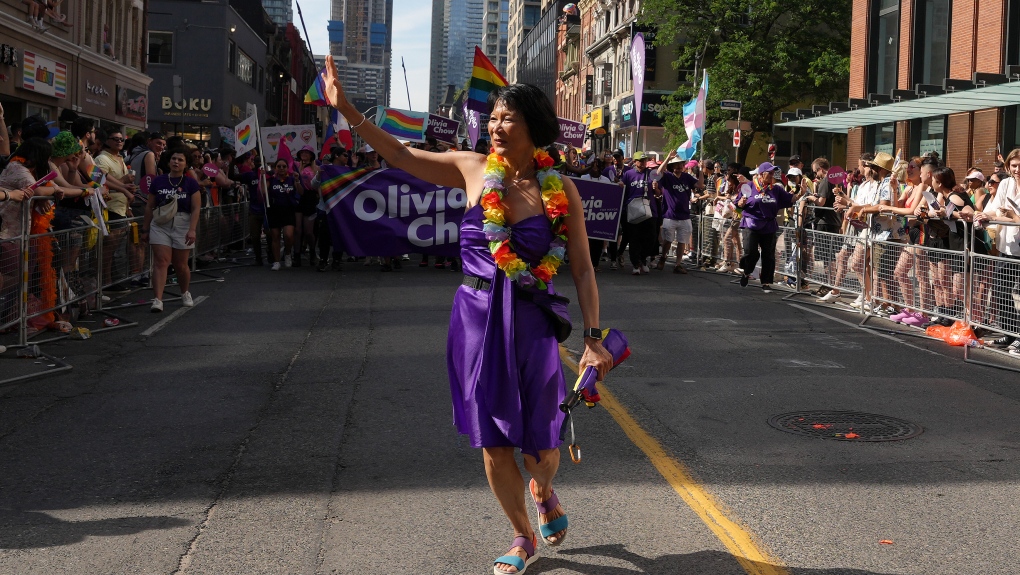 Toronto mayoral candidate Olivia Chow walks in the Toronto Pride Parade, on Sunday June 25, 2023. THE CANADIAN PRESS/Chris Young
Toronto mayoral candidate Olivia Chow walks in the Toronto Pride Parade, on Sunday June 25, 2023. THE CANADIAN PRESS/Chris Young
Her many years of experience and ongoing engagement with people in the city over the past few years, Chow said, allowed her to speak knowledgeably without worrying too much about how she comes off.
WHAT COMES NEXT
While Chow was a councillor for many years, she will be returning to a council that is much changed. Ford used his majority at Queen’s Park in 2018 to slash council in half and last year he bestowed strong mayor powers on Toronto.
Those new powers include a provision allowing the mayor to override a majority vote on council, though Chow has said she would not use that power, and will instead seek to make consensus with council. She’ll be helped in that regard by the six left-leaning councillors who supported her run.
While she will have more control over the city’s agenda as mayor, Chow will also inherit a city plagued by serious financial problems, namely a $1.5 billion deficit for fiscal 2022 and 2023 and the provincially-mandated loss of some development charges.
Chow has said she thinks she can negotiate a better deal with the higher levels of government by engaging the people of the city in a transparent negotiation and budgeting process. But if she can’t, she will almost certainly have to raise taxes or slash services.
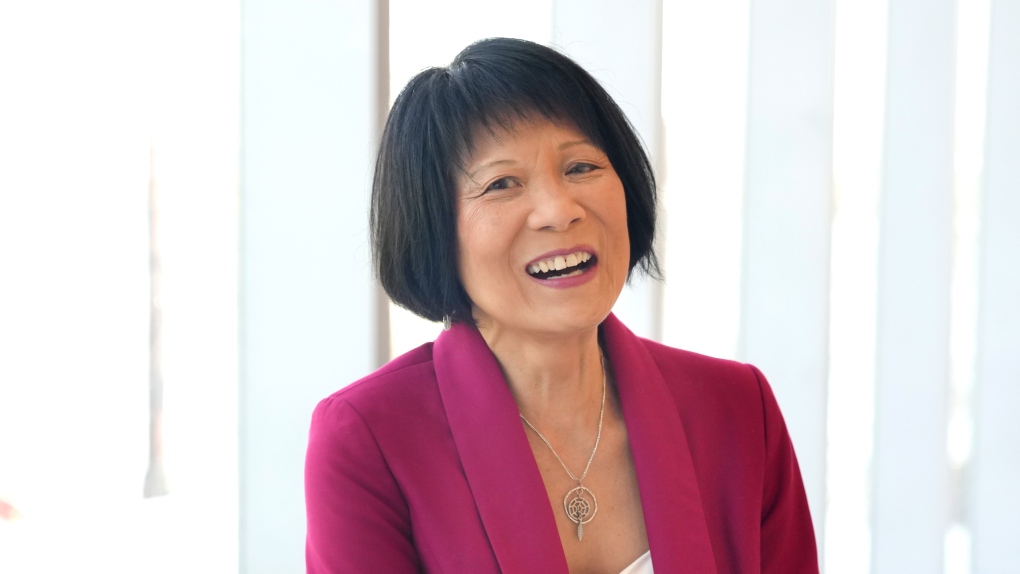 Toronto mayoral candidate Olivia Chow is photographed after a mayoral debate in Toronto, on Wednesday, May 24, 2023. THE CANADIAN PRESS/Chris Young
Toronto mayoral candidate Olivia Chow is photographed after a mayoral debate in Toronto, on Wednesday, May 24, 2023. THE CANADIAN PRESS/Chris Young
Chow has said repeatedly that she would not set an upper limit for property tax increases before first assessing the city’s needs. Her fellow candidates hammered her over the issue on the campaign trail, but she refused to back down on the point.
Chow has also said that she would save the city hundreds of millions of dollars by turning the eastern portion of the Gardiner Expressway into a boulevard instead of rebuilding it. That promise could potentially open old wounds on a contentious decision that was made by council seven years ago if she decides to hold firm on the commitment.
But Chow vowed during the campaign, recognizing the “immense” challenges the city faces, that she would do her best to bring people together, saying “Election Day is just the beginning.”
Some of her opponents in the race already seemed to be embracing that philosophy.
“Olivia and I have been political opponents but tomorrow we will be colleagues and I suspect there will be opportunities to collaborate,” Coun. Brad Bradford told CP24.
Josh Matlow will be another one of those colleagues. He too congratulated Chow and said he looks forward to working with her.
“I look forward to working constructively and collaboratively with you to build a better Toronto and to face our city’s challenges together,” Matlow said in a tweet.
The two councilors finished eighth and fifth respectively.
While Chow managed to secure a victory, political analyst Scott Reid told CP24 the close win wasn’t the runaway victory that had been predicted throughout the campaign.
“This is not the mandate she was hoping for or expected,” Reid said. “It’s a weak mandate.”
Her supporters on council nevertheless said they feel she’ll be able to work with council and the other levels of government to get things done.
“She’s going to be amazing at dealing with the provincial and federal governments and I know she’s going to work with council to put the interests of Toronto first,” said Coun. Alejandra Bravo, who supported Chow.
Chow’s win continues a tide of change that brought a number of progressive councillors – including Bravo – to city hall in October, despite the fact that Tory backed a number of their opponents.
CTVNews.ca Top Stories

LIVE AT 11 EST Trudeau to announce temporary GST relief on select items heading into holidays
Prime Minister Justin Trudeau will announce a two-month GST relief on select items heading into holidays to address affordability issues, sources confirm to CTV News.
'Ding-dong-ditch' prank leads to kidnapping, assault charges for Que. couple
A Saint-Sauveur couple was back in court on Wednesday, accused of attacking a teenager over a prank.
Border agency detained dozens of 'forced labour' cargo shipments. Now it's being sued
Canada's border agency says it has detained about 50 shipments of cargo over suspicions they were products of forced labour under rules introduced in 2020 — but only one was eventually determined to be in breach of the ban.
Parole board reverses decision and will allow families of Paul Bernardo's victims to attend upcoming parole hearing in person
The families of the victims of Paul Bernardo will be allowed to attend the serial killer’s upcoming parole hearing in person, the Parole Board of Canada (PBC) says.
At UN climate talks, 'sewage' beer from Singapore highlights water scarcity and innovations
In the sprawling pavilion section of the United Nations climate talks, where countries, nonprofits and tech companies use big, flashy signs to get the attention of the thousands of people walking through, small aqua and purple beverage cans sit conspicuously on a counter at the Singapore display.
Ontario man agrees to remove backyard hockey rink
A Markham hockey buff who built a massive backyard ice rink without permissions or permits has reluctantly agreed to remove the sprawling surface, following a years-long dispute with the city and his neighbours.
Genetic evidence backs up COVID-19 origin theory that pandemic started in seafood market
A group of researchers say they have more evidence to suggest the COVID-19 pandemic started in a Chinese seafood market where it spread from infected animals to humans. The evidence is laid out in a recent study published in Cell, a scientific journal, nearly five years after the first known COVID-19 outbreak.
EXCLUSIVE UBC investigating instructor following leaked audio of anti-Israel rant
A UBC instructor is facing backlash following the release of a 12-minute audio file from a lecture she gave on Sept. 18.
Estate sale Emily Carr painting bought for US$50 nets C$290,000 at Toronto auction
An Emily Carr painting that sold for US$50 at an estate sale has fetched C$290,000 at a Toronto auction.

































